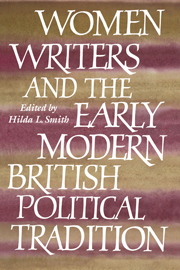Book contents
- Frontmatter
- Contents
- List of contributors
- Preface
- Introduction: Women, intellect, and politics: their intersection in seventeenth-century England
- Part I Women's political writings, 1400–1690
- Part II Women's political and philosophical writings, 1690–1800
- Part III The intellectual context and economic setting for early modern women
- Part IV Early modern legal and political prescriptions for women
- Introduction to Part IV
- 13 The politics of identity and monarchic government in France: the debate over female exclusion
- 14 The Holy Roman Empire: women and politics beyond liberalism, individual rights, and revolutionary theory
- 15 Women as sextons and electors: King's Bench and precedents for women's citizenship
- 16 “To be some body”: married women and The Hardships of the English Laws
- Conclusion: women's writing, women's standing: theory and politics in the early modern period
- Index
13 - The politics of identity and monarchic government in France: the debate over female exclusion
from Part IV - Early modern legal and political prescriptions for women
Published online by Cambridge University Press: 04 August 2010
- Frontmatter
- Contents
- List of contributors
- Preface
- Introduction: Women, intellect, and politics: their intersection in seventeenth-century England
- Part I Women's political writings, 1400–1690
- Part II Women's political and philosophical writings, 1690–1800
- Part III The intellectual context and economic setting for early modern women
- Part IV Early modern legal and political prescriptions for women
- Introduction to Part IV
- 13 The politics of identity and monarchic government in France: the debate over female exclusion
- 14 The Holy Roman Empire: women and politics beyond liberalism, individual rights, and revolutionary theory
- 15 Women as sextons and electors: King's Bench and precedents for women's citizenship
- 16 “To be some body”: married women and The Hardships of the English Laws
- Conclusion: women's writing, women's standing: theory and politics in the early modern period
- Index
Summary
In the public realm of France, amidst growing national consciousness, 1200s–1400s, through the period of nascent state building and centralization, 1500s–1700s, two juridical frameworks shaped political identity. The first, a resurrected French Salic law (Salic Law Code, 500s–800s), briefly mentioned in 1358, was alleged in the 1400s to be a public law excluding women (and their sons) from rule in a body politic represented, by some, as The king's one body. The second, a French Law Canon (civil law and public law) rooted in natural law, was formulated from the 1550s to the 1650s, establishing a monarchic state that privileged the male right to rule in state (king) and household (husband) through a parallel system of marital regime governance. Reflection upon the history of those law partners reveals the contested processes through which political identity was culturally configured in late medieval and early modern France, first as a neutral body politic, then as a political body incorporated in The king's one body. The odyssey of the Salic law offers an interesting trajectory, given its failure to attract attention (1358–1400), debated validity (1400s–1480s), tempered success (1480s–1530s), and awkward collapse (mid-1500s) under the accumulated weight of forgery and fraud requiring juridical revision.
In the 1400s some writers insisted that an ancient Salic ordinance juridically established the exclusion of women from rule in the kingdom of France.
- Type
- Chapter
- Information
- Women Writers and the Early Modern British Political Tradition , pp. 289 - 304Publisher: Cambridge University PressPrint publication year: 1998
- 4
- Cited by



